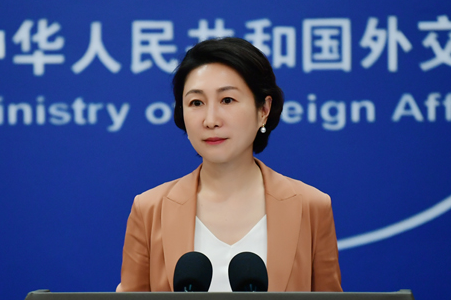Decoupling from China would only serve to alienate US


As China roars ahead, driving global recovery, it is time for the United States, the world's largest economy, to review its ties and policies for the common good.
Facts speak loudly. China's gross domestic product grew 2.3 percent last year, overcoming the COVID-19 storm, which caused severe disruption, and standing as the only major economy in the world to register growth.
Other major economies, such as the US, the European Union and the United Kingdom, suffered severe contractions. Analysts attribute China's return to growth to its ability to successfully control the pandemic and avoid the repeated major shutdowns that have plagued the world.
China's economy is undoubtedly now the engine of global growth, giving hope to markets and investors worldwide, especially those looking for certainty or a safe haven. It will be instrumental throughout this year in guiding other countries to recovery and spearheading a global return to prosperity.
However, it comes at a time when some countries are advocating the idea of decoupling-disengaging from the Chinese economy. The administration of former US president Donald Trump slapped numerous measures on Chinese companies and targeted China's exports.
These moves were a bad idea, adding to the detriment of the US as a whole. The world economy is globalized, and prosperity is contingent upon interdependence and mutual openness. As the latest US data shows, Trump's trade war against China had cost more than 245,000 jobs. Cutting ties with Beijing will not make the US become richer or grow faster.
As China positions itself for further growth this year, the new US administration of President Joe Biden should aim to rethink the legacy of Trump's self-defeating and counterproductive policies.
The Trump administration advocated a misleading train of thought that China prospered at the US' expense. This pushed a series of arguments that decoupling with Beijing in trade, financial and technological spheres would make the US wealthier and bring jobs home, as well as quash China's rise. This, of course, was completely false.
The global economy is not a zero-sum game. The economic fortunes of countries are interconnected, especially when things such as supply chains and consumer markets span multiple countries. When one major economy is hurt, others are hurt, too. But when one drives growth, others experience the ripple effects.
This year is set to see the global economy rebound. The proliferation of vaccines and the unwinding of lockdowns and travel restrictions will see life return to normal and businesses recover lost ground. But the cornerstone is China, which boasts the world's largest consumer market and industrial base and has proved resilient over the past year.
For investors and consumers worldwide, China is a safe bet, with 7 to 8 percent GDP growth forecast in the coming 12 months, which will subsequently have a ripple effect across countries seeking to escape massive slumps. China's recovery-coming in a cyclical, global form-means that imports from neighbors such as Japan and South Korea will boom.
Trump's decoupling logic did not stifle China as much as it damaged US interests. It was assumed by advisers of the Trump administration that a push for decoupling could divide the world into two economic blocs and alienate China, but given the size and global scope of its economy, this is just impossible.
Not surprisingly, the idea found little enthusiasm. Hence, two major economic agreements involving China-the EU-China Comprehensive Investment Agreement and the Regional Comprehensive Economic Partnership-were signed last year.
Such moves only serve to alienate the US and shift the balance of economic power away from it. The US needs to engage in the global economy to stay relevant, not disengage.
China's economic data should remind the Biden administration that the US has nothing to gain from its current path, and ought to moderate its approach toward Beijing in the view of facilitating its own recovery. Trump's spree of last-minute attacks against China did not seem to represent any strategic logic as much as they appeared to have been a bitter, last-minute outburst in pursuit of a confrontational Cold War vision.
Regardless, China will continue to drive global economic growth. It must be understood that openness-not confrontation-can bring about a global recovery and return to normality.
The author is a British political and international relations analyst.


































